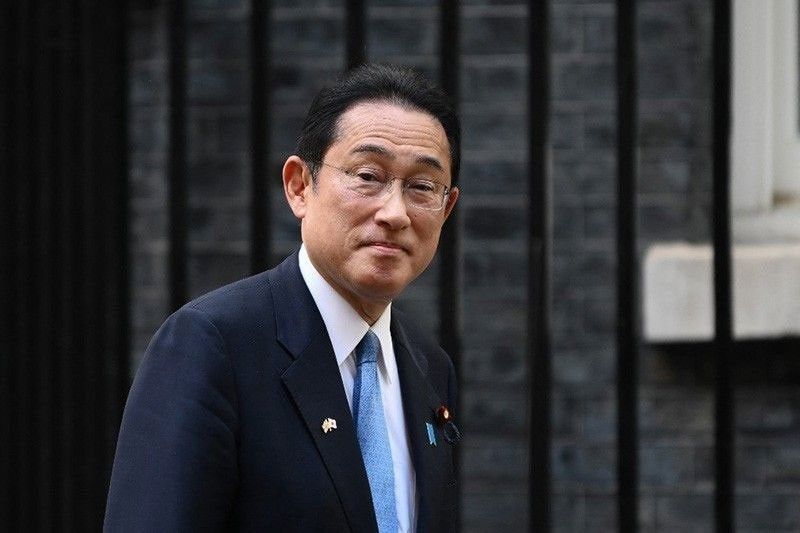Congress to honor Japanese PM in special session

MANILA, Philippines — Congress will convene for a special joint session after Undas to welcome Japanese Prime Minister Fumio Kishida during his official visit to the Philippines from Nov. 3 to 4.
The Senate will convene at 9 a.m. Saturday for both houses of Congress to separately pass two resolutions inviting Prime Minister Kishida to the legislature and another to convene the joint session.
Senators will then join their counterparts in the House of Representatives at the Batasang Pambansa complex to hear the Japanese prime minister’s address at 11 a.m., according to Senate President Juan Miguel Zubiri.
Among the 24 senators, those confirmed to physically attend are Zubiri, Majority Leader Joel Villanueva, Cynthia and Mark Villar, Bong Revilla, Lito Lapid, Robin Padilla, JV Ejercito, Risa Hontiveros, Francis Tolentino, Nancy Binay, Alan Peter Cayetano, Jinggoy Estrada, Imee Marcos, Grace Poe, Aquilino Pimentel III and Loren Legarda.
Zubiri said a joint Congress just in time for the resumption of session after the break “was an honor accorded to a foreign head of state only five times in Philippine history.”
The last one was when Congress convened in February 2006 to receive then Indian President Avul Pakir Jainulabdeen Abdul Kalam.
Congress also convened for Pakistan President Pervez Musharraf in April 2005, China President Hu Jintao in April 2005 and US Presidents George W. Bush (October 2003) and Dwight Eisenhower (June 1960).
Zubiri said the Japanese Prime Minister’s visit will “strengthen cooperation between two allies in confronting common challenges.”
“We look forward to the address of a leader of a nation that is a robust trading partner, a strong security ally, a lending hand during calamities and an investor in Philippine progress,” Zubiri said.
The Senate President called Japan the Philippines’ largest source of official development assistance (ODA) projects.
Citing data from the Department of Finance, Zubiri said Japanese ODA loans for the Philippines amounted to $14.139 billion or P7.77 trillion over 20 years, covering three presidencies from 2001 to 2020.
This accounts for 72 percent of the $19.656-billion total bilateral loan portfolio in the same period.
Zubiri said he invited Kishida to address Congress when the Philippine Senate delegation he headed paid Kishida a visit in Tokyo last April.
“We are honored that the good prime minister accepted our invitation for him to address the Filipino people through Congress,” Zubiri said.
President Marcos visited Japan last February for a five-day visit, during which Japan pledged 600 billion yen in development aid to help the Philippines achieve upper middle income status by 2025, and over $13 billion worth of contributions and pledges.
Zubiri said he expects Kishida to be briefed by Philippine officials about the status of Japanese-funded big-ticket projects, including the Metro Manila Subway and North South Commuter Railway projects.
He also said he proposed to Kishida for both countries to enter into an “enhanced security” deal called a “Reciprocal Access Agreement” (RAA), which was aimed at paving the way for a visiting forces agreement between Japan and the Philippines for joint military exercises.
The deal would be Japan’s first RAA with an ASEAN member and the third this year after similar pacts with Australia and Britain, Kyodo News earlier reported.
“(The) push for RAA … (will) allow both our troops (to) train in Japan and the Philippines for better cooperation and interoperability,” Zubiri said.
The Philippines is entering into security deals with other defense allies amid China’s increasing aggression in the South China Sea, the latest of which resulted in a collision between the China Coast Guard vessel and a Philippine resupply ship to Ayungin Shoal due to dangerous maneuvers by the Chinese.
Zubiri also hoped the visit will facilitate more loans from Japan after the Philippines pulled out from ODA loan negotiations with China over the Mindanao railway project.
“Hopefully, (we can) add possible loans to take over the failed projects of the Chinese government. Let’s let Japan handle these projects,” he said.
Speaker welcomes Kishida visit
At the House of Representatives, Speaker Martin Romualdez said the Japanese Prime Minister’s two-day official visit to the Philippines could open new doors for mutually beneficial collaboration.
“We are optimistic that through our discussions, new pathways for collaboration and development will emerge, promising enhanced opportunities and a brighter future for all Filipinos, here and in Japan,” Romualdez said yesterday.
“We warmly welcome his excellency Kishida Fumio, Prime Minister of Japan, on his significant official visit to our country on Nov. 3 and 4 this year... The House of Representatives, as the honored venue host of this significant event in the Batasang Pambansa Complex, is committed to exerting all efforts to ensure that Prime Minister Kishida’s visit is both fruitful and memorable,” Romualdez said.
“This visit, symbolizing the deep and longstanding bond our nations have forged, built on mutual respect, shared values and a unified vision for peace, stability and prosperity in the Asia-Pacific region, signifies the strength of our bilateral ties,” he added.
No to military access
Militant group Bagong Alyansang Makabayan (Bayan), however, is opposing plans for a military access agreement between the Philippines and Japan.
In a statement, Bayan president Renato Reyes said allowing Japanese troops to join military exercises in the Philippines will just be another version of a visiting forces agreement which the country already has with the United States.
Reyes said the agreement is part of the entire network of the US in the region, with Japan serving as its junior partner and the Philippines playing a role as vital cog of Washington’s war machine.
Reyes made the statement as Prime Minister Kishida will embark on an official visit in the country to bolster ties between the two countries. — Emmanuel Tupas, Cecille Suerte Felipe, Delon Porcalla
- Latest
- Trending































